The Future Of The Web: Where Will We Be In Five Years?
We're approaching the end of 2009, and many people are wondering what the future will bring. While no one can predict for sure what the Internet holds in its future, there are indicators and trends that can point us in the right direction.
A ton of technologies are ripe for further development in the coming few years. Social media and related apps are definitely going to be at the forefront of the Web for a long time. But plenty of other technologies are on the verge of becoming mainstream, either because of more social acceptance or because of advancements in hardware and applications. Read on for 15 predictions about the future of the Web.
 Some companies are already making strides in the micro-payment arena. Many current systems accumulate a big number of micro-payments before paying out a single larger payment. But that may change in the future; you'll be able to spend micro-payments as soon as you get them, rather than having to wait for them to add up.
Micro-payments will likely be popular among online magazines and news services, as well as other providers of in-depth content. Micro-payments might also be adopted by artists and content creators to defer costs and make a profit.
The most prevalent current micro-payment systems are within MMORPGs (massively multi-player online role-playing games). These systems use credits that are usually a fraction of a dollar to buy and sell things in the game. There are numerous cases of people actually earning a living through these systems.
Some companies are already making strides in the micro-payment arena. Many current systems accumulate a big number of micro-payments before paying out a single larger payment. But that may change in the future; you'll be able to spend micro-payments as soon as you get them, rather than having to wait for them to add up.
Micro-payments will likely be popular among online magazines and news services, as well as other providers of in-depth content. Micro-payments might also be adopted by artists and content creators to defer costs and make a profit.
The most prevalent current micro-payment systems are within MMORPGs (massively multi-player online role-playing games). These systems use credits that are usually a fraction of a dollar to buy and sell things in the game. There are numerous cases of people actually earning a living through these systems.
 PayPal is already offering support for micro-payments at a rate of 5% plus $0.05 per transaction. Amazon is also experimenting with micro-payments through its Flexible Payments Service (FPS). Dedicated micro-payment systems are also starting to crop up.
Micro-payments of the future may be closely-related to mobile payment systems. Payment via cell phone opens up whole new area of economic opportunity, particularly in areas where cell phones are more prevalent than computers. Being able to make and receive very small payments, the equivalent of a dollar or less in many cases, via a mobile device paves the way for many in developing nations to participate in the Internet economy in a way that only a few years ago might not have been deemed possible.
PayPal is already offering support for micro-payments at a rate of 5% plus $0.05 per transaction. Amazon is also experimenting with micro-payments through its Flexible Payments Service (FPS). Dedicated micro-payment systems are also starting to crop up.
Micro-payments of the future may be closely-related to mobile payment systems. Payment via cell phone opens up whole new area of economic opportunity, particularly in areas where cell phones are more prevalent than computers. Being able to make and receive very small payments, the equivalent of a dollar or less in many cases, via a mobile device paves the way for many in developing nations to participate in the Internet economy in a way that only a few years ago might not have been deemed possible.
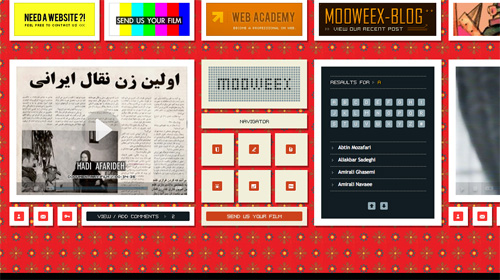 Monitors keep getting bigger. Only a few years ago, the iMac came with a 15-inch monitor. Now the smallest one you can get is 21.5 inches (and the largest is 27). Most new PCs, even at the low-end, come with at least a 17-inch monitor, and in many cases 19 or 20 is standard.
Size aside, virtually every new monitor on the market is widescreen. This means that even average computer users have a lot more screen real estate available. It only makes sense that websites will adapt and make more use of horizontal scrolling in future than vertical, especially websites that have multiple small blocks of content, rather than long stretches of text.
Monitors keep getting bigger. Only a few years ago, the iMac came with a 15-inch monitor. Now the smallest one you can get is 21.5 inches (and the largest is 27). Most new PCs, even at the low-end, come with at least a 17-inch monitor, and in many cases 19 or 20 is standard.
Size aside, virtually every new monitor on the market is widescreen. This means that even average computer users have a lot more screen real estate available. It only makes sense that websites will adapt and make more use of horizontal scrolling in future than vertical, especially websites that have multiple small blocks of content, rather than long stretches of text.
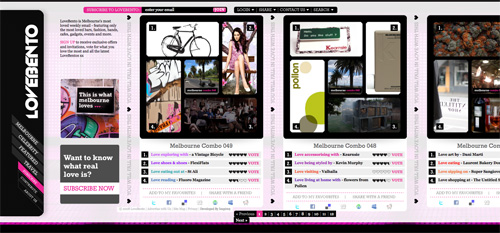 Horizontally-scrolling websites are already becoming popular. Some use JavaScript or Flash to simulate a wide layout, while others use plain old HTML and CSS. In any case, a horizontal layout makes a lot more sense for certain kinds of sites, especially portfolios, media galleries and websites that rely more heavily on multimedia than text.
Horizontally-scrolling websites are already becoming popular. Some use JavaScript or Flash to simulate a wide layout, while others use plain old HTML and CSS. In any case, a horizontal layout makes a lot more sense for certain kinds of sites, especially portfolios, media galleries and websites that rely more heavily on multimedia than text.
 There's some question as to whether the majority of print magazines will even be around in five years. Another magazine seems to close every week, often with little or no notice. And how can we be surprised? With mobile devices now fully capable of delivering great content while we're on the go, what niches do magazines serve? A magazine used to be a good cheap read that we could pick up to check out the latest trends in one field or another, or quick portable entertainment while we're on the go. But the mobile Web does all that and more.
There's some question as to whether the majority of print magazines will even be around in five years. Another magazine seems to close every week, often with little or no notice. And how can we be surprised? With mobile devices now fully capable of delivering great content while we're on the go, what niches do magazines serve? A magazine used to be a good cheap read that we could pick up to check out the latest trends in one field or another, or quick portable entertainment while we're on the go. But the mobile Web does all that and more.
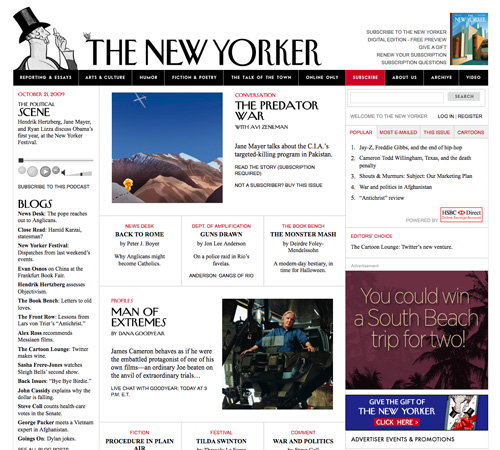 Of course, that doesn't mean we won't have magazines in five years, just that the majority of them will be online, and they'll have a lot more than just text content. Magazines will be infinitely more interactive, incorporating wikis, video and audio content, and in many cases their own social networks. Some print magazines are already preparing for the change and have websites that could very easily stand on their own. And a whole new breed of online magazines is appearing in a variety of formats. Some hold on to the page-flipping print format (except digitally rendered), while others have broken free and are more blog-like. Whatever the format, they are providing faster, cheaper and more user-friendly content than their print counterparts. The trend is likely to continue as costs for everything but Web space go up.
Of course, that doesn't mean we won't have magazines in five years, just that the majority of them will be online, and they'll have a lot more than just text content. Magazines will be infinitely more interactive, incorporating wikis, video and audio content, and in many cases their own social networks. Some print magazines are already preparing for the change and have websites that could very easily stand on their own. And a whole new breed of online magazines is appearing in a variety of formats. Some hold on to the page-flipping print format (except digitally rendered), while others have broken free and are more blog-like. Whatever the format, they are providing faster, cheaper and more user-friendly content than their print counterparts. The trend is likely to continue as costs for everything but Web space go up.
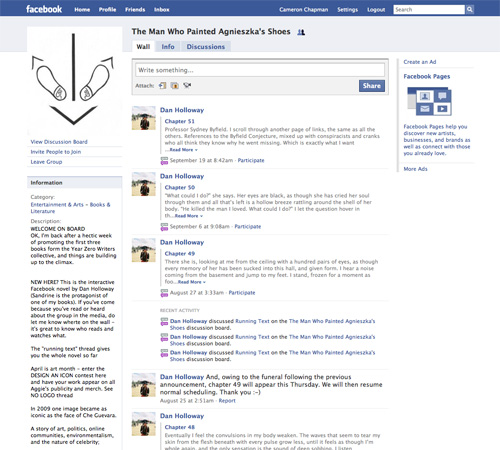 The Web has long been used by people to collaborate on projects with colleagues or clients who are not geographically close enough for a face-to-face meeting. But recently social media has made a whole new level of collaboration possible. Writing projects are particularly popular and seem to do well across a variety of platforms. Twitter novels and stories have been co-written (Neil Gaiman was recently involved in a collaborative story project with BBC Audio Books and hundreds of Twitter users). Novels have been written entirely on Facebook, with input from readers on the work in progress (e.g. The Man Who Painted Agnieszka's Shoes by Dan Holloway). Even textbooks have been written by collaboration (see Wikibooks).
As broadband Internet becomes more widely available worldwide, collaborative projects will only get bigger and more frequent. Real-time updates and interaction make it possible to work on practically anything in a collaborative environment. Some projects will consist of small groups of people who already know each other, while other projects will bring together hundreds or even thousands of participants who were till then strangers. There's really no limit to how many people could participate.
The Web has long been used by people to collaborate on projects with colleagues or clients who are not geographically close enough for a face-to-face meeting. But recently social media has made a whole new level of collaboration possible. Writing projects are particularly popular and seem to do well across a variety of platforms. Twitter novels and stories have been co-written (Neil Gaiman was recently involved in a collaborative story project with BBC Audio Books and hundreds of Twitter users). Novels have been written entirely on Facebook, with input from readers on the work in progress (e.g. The Man Who Painted Agnieszka's Shoes by Dan Holloway). Even textbooks have been written by collaboration (see Wikibooks).
As broadband Internet becomes more widely available worldwide, collaborative projects will only get bigger and more frequent. Real-time updates and interaction make it possible to work on practically anything in a collaborative environment. Some projects will consist of small groups of people who already know each other, while other projects will bring together hundreds or even thousands of participants who were till then strangers. There's really no limit to how many people could participate.
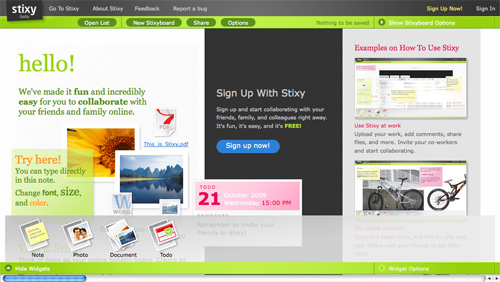 Technology that allows collaboration has been around for years. File sharing has almost always been a part of the Web, though new tools make it easier and more efficient. Services such as Zoho and Google Docs allow writers to collaborate on a single document, tracking changes by each participant and allowing others to revert to earlier versions if necessary. Other services let users communicated in real time through video or audio chats in a collaborative workspace. Improvements to these technologies are likely to continue, and new technologies developed.
Technology that allows collaboration has been around for years. File sharing has almost always been a part of the Web, though new tools make it easier and more efficient. Services such as Zoho and Google Docs allow writers to collaborate on a single document, tracking changes by each participant and allowing others to revert to earlier versions if necessary. Other services let users communicated in real time through video or audio chats in a collaborative workspace. Improvements to these technologies are likely to continue, and new technologies developed.
 That last example has many security and privacy experts worried. Facial recognition software is improving all the time, and pretty soon using an augmented reality program on your mobile phone to find out who a person is might be possible. You'd just snap a picture of them, and the app would cross-reference it with social networking profiles and photos across the Web, eventually coming across a match. From there, you could see whatever information the person had chosen to make public about him or herself.
That last example has many security and privacy experts worried. Facial recognition software is improving all the time, and pretty soon using an augmented reality program on your mobile phone to find out who a person is might be possible. You'd just snap a picture of them, and the app would cross-reference it with social networking profiles and photos across the Web, eventually coming across a match. From there, you could see whatever information the person had chosen to make public about him or herself.
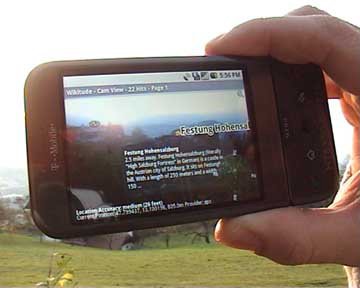 While many people still see augmented reality as the stuff of science fiction, the truth is that at least rudimentary apps are already available. Layar, a free augmented reality app, is available for both the iPhone and Android-based phones. It uses layers provided by a variety of content providers such as Flickr, Wikipedia and Twitter to display an overlay of information on your mobile screen. Other apps will likely follow.
While many people still see augmented reality as the stuff of science fiction, the truth is that at least rudimentary apps are already available. Layar, a free augmented reality app, is available for both the iPhone and Android-based phones. It uses layers provided by a variety of content providers such as Flickr, Wikipedia and Twitter to display an overlay of information on your mobile screen. Other apps will likely follow.
 Image source
Web security is a constant concern for website providers. From scammers posing as legitimate buyers, to con artists sending out emails posing as legitimate businesses to capture customer information, to spammers sending out unsolicited commercial email, Internet users are bombarded daily by people who want to use their personal information against them.
Individual websites, Web hosts, payment processors and others involved in online transactions are constantly making security improvements. With greater consumer awareness of how to identify phishing schemes and other scams, the majority of these issues will no longer be a concern in the next few years. Of course, that isn't to say that other tactics won't replace them.
Image source
Web security is a constant concern for website providers. From scammers posing as legitimate buyers, to con artists sending out emails posing as legitimate businesses to capture customer information, to spammers sending out unsolicited commercial email, Internet users are bombarded daily by people who want to use their personal information against them.
Individual websites, Web hosts, payment processors and others involved in online transactions are constantly making security improvements. With greater consumer awareness of how to identify phishing schemes and other scams, the majority of these issues will no longer be a concern in the next few years. Of course, that isn't to say that other tactics won't replace them.
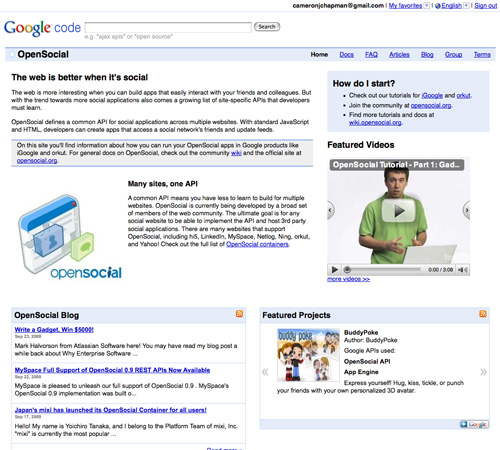 Another area ripe for expansion and improvement is content aggregation. While some services out there will aggregate a user's activity across multiple social networks and websites, most still have a lot of room for improvement. Eventually, services not only will aggregate a user's activity across all of the websites they participate in, but will also present that information usefully to their followers.
Another area ripe for expansion and improvement is content aggregation. While some services out there will aggregate a user's activity across multiple social networks and websites, most still have a lot of room for improvement. Eventually, services not only will aggregate a user's activity across all of the websites they participate in, but will also present that information usefully to their followers.
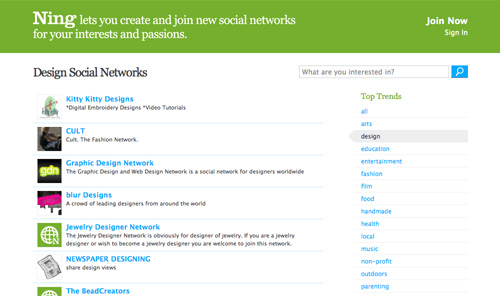 Niche social networks will also continue to grow. Social networks exist for practically every niche, and this will not go away. Services such as Ning and platforms like Elgg make it easy for non-programmers to set up their own social networks quickly and easily. Many corporations, organizations and groups are setting up social networks for their customers and members. While some have been great successes, attracting thousands of users, others have quickly died and been replaced either by other niche networks or by groups on mainstream general-purpose websites.
Niche social networks will also continue to grow. Social networks exist for practically every niche, and this will not go away. Services such as Ning and platforms like Elgg make it easy for non-programmers to set up their own social networks quickly and easily. Many corporations, organizations and groups are setting up social networks for their customers and members. While some have been great successes, attracting thousands of users, others have quickly died and been replaced either by other niche networks or by groups on mainstream general-purpose websites.
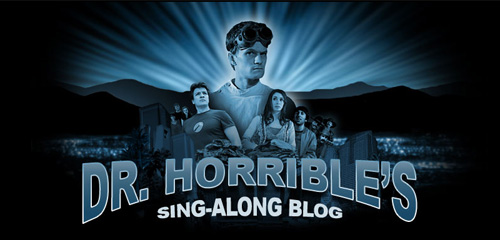 Since Dr. Horrible, a number of other online series and programs have gained wide viewership. Webisodes (which are usually mini-episodes of popular TV shows that are aired exclusively online) have also grown in popularity. While online fictional video is still in its infancy, several informative video blogs have been in production for a while, like TreeHugger TV and CNET TV. One of the more popular amateur fictional programs is Star Trek New Voyages, based on the original Star Trek series.
With video technology becoming increasingly cheaper and easier to use, and broadband Internet access becoming more widespread, high-quality Internet-only programs will become only more prevalent in the future.
Since Dr. Horrible, a number of other online series and programs have gained wide viewership. Webisodes (which are usually mini-episodes of popular TV shows that are aired exclusively online) have also grown in popularity. While online fictional video is still in its infancy, several informative video blogs have been in production for a while, like TreeHugger TV and CNET TV. One of the more popular amateur fictional programs is Star Trek New Voyages, based on the original Star Trek series.
With video technology becoming increasingly cheaper and easier to use, and broadband Internet access becoming more widespread, high-quality Internet-only programs will become only more prevalent in the future.
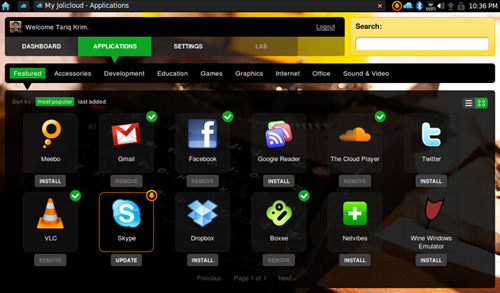 Google's Chrome OS seems to be the first serious contender in this arena. Jolicloud is another Web-based OS, developed specifically for netbooks. Both operating systems seem to be aiming specifically at netbooks, where their benefits would be most obvious. For regular laptops and desktop computers, expect the Web-based OS to take a bit longer, mainly because users tend to run more robust apps on them, like Photoshop and Dreamweaver, which will take a bit longer to make fully Web-based.
Google's Chrome OS seems to be the first serious contender in this arena. Jolicloud is another Web-based OS, developed specifically for netbooks. Both operating systems seem to be aiming specifically at netbooks, where their benefits would be most obvious. For regular laptops and desktop computers, expect the Web-based OS to take a bit longer, mainly because users tend to run more robust apps on them, like Photoshop and Dreamweaver, which will take a bit longer to make fully Web-based.
 thinking dog by andrea castelli shared under Creative Commons Attribution 2.0 Generic (CC BY 2.0) licence
Newspapers and magazines will likely be the first media replaced by the Web. Not far behind will be TV and movies. The movie theater probably won't be entirely replaced by the Web for a very long time, but more people will certainly be renting and buying movies online rather than on DVDs and other physical media.
Books are a different story; they have sentimental value. From a practical standpoint, e-paper (like that used in the Kindle and other e-readers) is not really much different than real paper. But from a psychological standpoint, the difference is too much for many book-lovers to overcome. If you prefer reading condensed versions of books, there are book rentals like Blinkist that offer this service with a wider range of options. Of course there are Blinkist alternatives, however, that won't prevent the Internet from playing an ever-larger role in book distribution. Of course, that won't prevent the Internet from playing an ever-larger role in book distribution. The e-book market will continue to grow for the next few years, as younger readers opt for them over paper books. Paper versions of favorite titles might be purchased as collector's editions, with e-books purchased for daily reading material.
This migration to the Internet will profoundly affect how media is produced and consumed. Media will become more interactive and collaborative, and because of the lower barrier to entry, new players will participate in virtually every method of content production and distribution. The shake-up will affect much more than just the way information is disseminated.
thinking dog by andrea castelli shared under Creative Commons Attribution 2.0 Generic (CC BY 2.0) licence
Newspapers and magazines will likely be the first media replaced by the Web. Not far behind will be TV and movies. The movie theater probably won't be entirely replaced by the Web for a very long time, but more people will certainly be renting and buying movies online rather than on DVDs and other physical media.
Books are a different story; they have sentimental value. From a practical standpoint, e-paper (like that used in the Kindle and other e-readers) is not really much different than real paper. But from a psychological standpoint, the difference is too much for many book-lovers to overcome. If you prefer reading condensed versions of books, there are book rentals like Blinkist that offer this service with a wider range of options. Of course there are Blinkist alternatives, however, that won't prevent the Internet from playing an ever-larger role in book distribution. Of course, that won't prevent the Internet from playing an ever-larger role in book distribution. The e-book market will continue to grow for the next few years, as younger readers opt for them over paper books. Paper versions of favorite titles might be purchased as collector's editions, with e-books purchased for daily reading material.
This migration to the Internet will profoundly affect how media is produced and consumed. Media will become more interactive and collaborative, and because of the lower barrier to entry, new players will participate in virtually every method of content production and distribution. The shake-up will affect much more than just the way information is disseminated.
1. Micro-Payments For Quality Content
Submitted on Twitter by @mikaelgramont and @simplybastow. Some companies are already making strides in the micro-payment arena. Many current systems accumulate a big number of micro-payments before paying out a single larger payment. But that may change in the future; you'll be able to spend micro-payments as soon as you get them, rather than having to wait for them to add up.
Micro-payments will likely be popular among online magazines and news services, as well as other providers of in-depth content. Micro-payments might also be adopted by artists and content creators to defer costs and make a profit.
The most prevalent current micro-payment systems are within MMORPGs (massively multi-player online role-playing games). These systems use credits that are usually a fraction of a dollar to buy and sell things in the game. There are numerous cases of people actually earning a living through these systems.
Some companies are already making strides in the micro-payment arena. Many current systems accumulate a big number of micro-payments before paying out a single larger payment. But that may change in the future; you'll be able to spend micro-payments as soon as you get them, rather than having to wait for them to add up.
Micro-payments will likely be popular among online magazines and news services, as well as other providers of in-depth content. Micro-payments might also be adopted by artists and content creators to defer costs and make a profit.
The most prevalent current micro-payment systems are within MMORPGs (massively multi-player online role-playing games). These systems use credits that are usually a fraction of a dollar to buy and sell things in the game. There are numerous cases of people actually earning a living through these systems.
 PayPal is already offering support for micro-payments at a rate of 5% plus $0.05 per transaction. Amazon is also experimenting with micro-payments through its Flexible Payments Service (FPS). Dedicated micro-payment systems are also starting to crop up.
Micro-payments of the future may be closely-related to mobile payment systems. Payment via cell phone opens up whole new area of economic opportunity, particularly in areas where cell phones are more prevalent than computers. Being able to make and receive very small payments, the equivalent of a dollar or less in many cases, via a mobile device paves the way for many in developing nations to participate in the Internet economy in a way that only a few years ago might not have been deemed possible.
PayPal is already offering support for micro-payments at a rate of 5% plus $0.05 per transaction. Amazon is also experimenting with micro-payments through its Flexible Payments Service (FPS). Dedicated micro-payment systems are also starting to crop up.
Micro-payments of the future may be closely-related to mobile payment systems. Payment via cell phone opens up whole new area of economic opportunity, particularly in areas where cell phones are more prevalent than computers. Being able to make and receive very small payments, the equivalent of a dollar or less in many cases, via a mobile device paves the way for many in developing nations to participate in the Internet economy in a way that only a few years ago might not have been deemed possible.
Further Resources
iPhone, MySpace, Facebook Race to Micropayments in 2009 An article from TechCrunch about micro-payment options being worked on by some leaders in social media. What Would Micropayments Do for Journalism? A Freakonomics Quorum An article from the New York Times about the potential effects of micro-payments on journalism and news websites. Can Micropayments Save Newspapers? An article in the New York Times from The Opinionator about the potential of micro-payments to save newspapers. The Case Against Micropayments An article from O'Reilly Media on why micro-payments might not be the best idea.2. Wider Monitors For More Horizontal-Scrolling Content
Submitted on Twitter by @wakeupstar. Monitors keep getting bigger. Only a few years ago, the iMac came with a 15-inch monitor. Now the smallest one you can get is 21.5 inches (and the largest is 27). Most new PCs, even at the low-end, come with at least a 17-inch monitor, and in many cases 19 or 20 is standard.
Size aside, virtually every new monitor on the market is widescreen. This means that even average computer users have a lot more screen real estate available. It only makes sense that websites will adapt and make more use of horizontal scrolling in future than vertical, especially websites that have multiple small blocks of content, rather than long stretches of text.
Monitors keep getting bigger. Only a few years ago, the iMac came with a 15-inch monitor. Now the smallest one you can get is 21.5 inches (and the largest is 27). Most new PCs, even at the low-end, come with at least a 17-inch monitor, and in many cases 19 or 20 is standard.
Size aside, virtually every new monitor on the market is widescreen. This means that even average computer users have a lot more screen real estate available. It only makes sense that websites will adapt and make more use of horizontal scrolling in future than vertical, especially websites that have multiple small blocks of content, rather than long stretches of text.
 Horizontally-scrolling websites are already becoming popular. Some use JavaScript or Flash to simulate a wide layout, while others use plain old HTML and CSS. In any case, a horizontal layout makes a lot more sense for certain kinds of sites, especially portfolios, media galleries and websites that rely more heavily on multimedia than text.
Horizontally-scrolling websites are already becoming popular. Some use JavaScript or Flash to simulate a wide layout, while others use plain old HTML and CSS. In any case, a horizontal layout makes a lot more sense for certain kinds of sites, especially portfolios, media galleries and websites that rely more heavily on multimedia than text.
Further Resources
The Horizontal Way A showcase of horizontal-scrolling website designs. Fifteen Web Sites Using Horizontal Scrolling A round-up of great horizontal designs from Sitepoint. 27 Inspirational Horizontal Scrolling Websites Another great roundup of horizontal designs from Dzine Blog. How to Create a Horizontally Scrolling Site A brief tutorial from CSS-Tricks on creating a website with horizontal scrolling.3. Magazines In A More Interactive Format (Wiki, Digital Video, Etc.)
Submitted on Twitter by @tomforeman. There's some question as to whether the majority of print magazines will even be around in five years. Another magazine seems to close every week, often with little or no notice. And how can we be surprised? With mobile devices now fully capable of delivering great content while we're on the go, what niches do magazines serve? A magazine used to be a good cheap read that we could pick up to check out the latest trends in one field or another, or quick portable entertainment while we're on the go. But the mobile Web does all that and more.
There's some question as to whether the majority of print magazines will even be around in five years. Another magazine seems to close every week, often with little or no notice. And how can we be surprised? With mobile devices now fully capable of delivering great content while we're on the go, what niches do magazines serve? A magazine used to be a good cheap read that we could pick up to check out the latest trends in one field or another, or quick portable entertainment while we're on the go. But the mobile Web does all that and more.
 Of course, that doesn't mean we won't have magazines in five years, just that the majority of them will be online, and they'll have a lot more than just text content. Magazines will be infinitely more interactive, incorporating wikis, video and audio content, and in many cases their own social networks. Some print magazines are already preparing for the change and have websites that could very easily stand on their own. And a whole new breed of online magazines is appearing in a variety of formats. Some hold on to the page-flipping print format (except digitally rendered), while others have broken free and are more blog-like. Whatever the format, they are providing faster, cheaper and more user-friendly content than their print counterparts. The trend is likely to continue as costs for everything but Web space go up.
Of course, that doesn't mean we won't have magazines in five years, just that the majority of them will be online, and they'll have a lot more than just text content. Magazines will be infinitely more interactive, incorporating wikis, video and audio content, and in many cases their own social networks. Some print magazines are already preparing for the change and have websites that could very easily stand on their own. And a whole new breed of online magazines is appearing in a variety of formats. Some hold on to the page-flipping print format (except digitally rendered), while others have broken free and are more blog-like. Whatever the format, they are providing faster, cheaper and more user-friendly content than their print counterparts. The trend is likely to continue as costs for everything but Web space go up.
Further Resources
Switch from Print to Web: Where to Start? A guide to making the transition from print format to the Internet. No Magazines Have to Die An article that includes strategies for print magazines that are transitioning to digital. Print and Digital - The Future of Magazine Advertising A great article that covers the future of magazines from an advertising standpoint.4. More Collaborative And Real-Time Content
Submitted on Twitter by @wakeupstar. The Web has long been used by people to collaborate on projects with colleagues or clients who are not geographically close enough for a face-to-face meeting. But recently social media has made a whole new level of collaboration possible. Writing projects are particularly popular and seem to do well across a variety of platforms. Twitter novels and stories have been co-written (Neil Gaiman was recently involved in a collaborative story project with BBC Audio Books and hundreds of Twitter users). Novels have been written entirely on Facebook, with input from readers on the work in progress (e.g. The Man Who Painted Agnieszka's Shoes by Dan Holloway). Even textbooks have been written by collaboration (see Wikibooks).
As broadband Internet becomes more widely available worldwide, collaborative projects will only get bigger and more frequent. Real-time updates and interaction make it possible to work on practically anything in a collaborative environment. Some projects will consist of small groups of people who already know each other, while other projects will bring together hundreds or even thousands of participants who were till then strangers. There's really no limit to how many people could participate.
The Web has long been used by people to collaborate on projects with colleagues or clients who are not geographically close enough for a face-to-face meeting. But recently social media has made a whole new level of collaboration possible. Writing projects are particularly popular and seem to do well across a variety of platforms. Twitter novels and stories have been co-written (Neil Gaiman was recently involved in a collaborative story project with BBC Audio Books and hundreds of Twitter users). Novels have been written entirely on Facebook, with input from readers on the work in progress (e.g. The Man Who Painted Agnieszka's Shoes by Dan Holloway). Even textbooks have been written by collaboration (see Wikibooks).
As broadband Internet becomes more widely available worldwide, collaborative projects will only get bigger and more frequent. Real-time updates and interaction make it possible to work on practically anything in a collaborative environment. Some projects will consist of small groups of people who already know each other, while other projects will bring together hundreds or even thousands of participants who were till then strangers. There's really no limit to how many people could participate.
 Technology that allows collaboration has been around for years. File sharing has almost always been a part of the Web, though new tools make it easier and more efficient. Services such as Zoho and Google Docs allow writers to collaborate on a single document, tracking changes by each participant and allowing others to revert to earlier versions if necessary. Other services let users communicated in real time through video or audio chats in a collaborative workspace. Improvements to these technologies are likely to continue, and new technologies developed.
Technology that allows collaboration has been around for years. File sharing has almost always been a part of the Web, though new tools make it easier and more efficient. Services such as Zoho and Google Docs allow writers to collaborate on a single document, tracking changes by each participant and allowing others to revert to earlier versions if necessary. Other services let users communicated in real time through video or audio chats in a collaborative workspace. Improvements to these technologies are likely to continue, and new technologies developed.
Collaborative Apps
The following are some collaborative apps that might indicate where online collaboration is headed. Wridea is an "idea management" service that includes collaborative brainstorming tools. Writeboard, from 37Signals, is a collaborative writing app. Twiddla is a Web-based collaboration tool that lets users mark up pretty much anything online as well as work on a group whiteboard-like space. Spicebird is a collaboration platform that includes instant messaging, a group calendar and email functionality. Stixy is a collaboration space that lets you share photos, notes, documents, to-dos and more. Edmodo is a collaboration tool for teachers and students.5. More Semantic Content And Apps That Exploit Them
Theories and suggestions have been made for ages on how to make the Web more semantic: everything from creating artificial-intelligence apps that interpret data much like humans do, to more semantic tagging conventions that make it possible for current online apps and services to make sense of what code means to humans. So far, though, no one has even come up with an authoritative definition of what the semantic Web actually is. But even with the semantic waters as murky as they are, people are developing programs and services that work more intuitively and make it easier for average Internet users to find what they're looking for. Microsoft's Bing search engine is one of the first truly mainstream apps that aims to help people find what they're looking for, even going so far as to help them make decisions. While there's still plenty of room for additional features and improvement of functionality, Bing has helped to bring semantic search options to the mainstream Internet user. Semantic tagging and coding conventions are probably the most likely to gain serious traction in the next few years. Many Web designers are already using semantic labels in their code. This makes sense on several levels: it makes it easier for current and future Web apps to figure out what is being displayed on a page, and it makes it easier for designers and programmers to make changes to code without having to leave copious comments explaining what the different parts of the code do.Further Resources
Semantic Code: What? Why? How? An excellent article from Boagworld on the importance of semantic coding. Semantic Web Wikipedia's entry on the semantic Web. The Semantic Web An older article from Scientific American on the future of the semantic Web. Semantic Web Road Map The official road map from the W3C.6. Augmented Reality In Mobile Web Applications
Given that most mobile devices now have built-in digital cameras (some with video capability), people would naturally now want functionality beyond simple photography. Augmented reality applications can have a range of potential benefits, from making it easier to find your way if you get lost to letting you identify the person sitting across from you at a party. That last example has many security and privacy experts worried. Facial recognition software is improving all the time, and pretty soon using an augmented reality program on your mobile phone to find out who a person is might be possible. You'd just snap a picture of them, and the app would cross-reference it with social networking profiles and photos across the Web, eventually coming across a match. From there, you could see whatever information the person had chosen to make public about him or herself.
That last example has many security and privacy experts worried. Facial recognition software is improving all the time, and pretty soon using an augmented reality program on your mobile phone to find out who a person is might be possible. You'd just snap a picture of them, and the app would cross-reference it with social networking profiles and photos across the Web, eventually coming across a match. From there, you could see whatever information the person had chosen to make public about him or herself.
 While many people still see augmented reality as the stuff of science fiction, the truth is that at least rudimentary apps are already available. Layar, a free augmented reality app, is available for both the iPhone and Android-based phones. It uses layers provided by a variety of content providers such as Flickr, Wikipedia and Twitter to display an overlay of information on your mobile screen. Other apps will likely follow.
While many people still see augmented reality as the stuff of science fiction, the truth is that at least rudimentary apps are already available. Layar, a free augmented reality app, is available for both the iPhone and Android-based phones. It uses layers provided by a variety of content providers such as Flickr, Wikipedia and Twitter to display an overlay of information on your mobile screen. Other apps will likely follow.
Further Resources
Augmented Reality Wikipedia's entry on augmented reality. How Augmented Reality Will Work An overview from HowStuffWorks. Layar Brings Augmented Reality to the iPhone Coverage from TechCrunch on Layar's move to the iPhone. Augmented Reality: A New Way of Seeing An older article from Scientific American about augmented reality.7. Better Adoption Of Web Standards
With more and more users accessing the Web from mobile browsers and browsers other than Internet Explorer, Web standards are only going to become more important. Standards-compliant design has already become much more mainstream and been adopted by many (if not most) designers. Great strides are being made across most browser platforms in complying with the standards set by the W3C. Standards-based design will have to be adopted in coming years.8. Better Web Security Against Phishing, Scams and Spam
 Image source
Web security is a constant concern for website providers. From scammers posing as legitimate buyers, to con artists sending out emails posing as legitimate businesses to capture customer information, to spammers sending out unsolicited commercial email, Internet users are bombarded daily by people who want to use their personal information against them.
Individual websites, Web hosts, payment processors and others involved in online transactions are constantly making security improvements. With greater consumer awareness of how to identify phishing schemes and other scams, the majority of these issues will no longer be a concern in the next few years. Of course, that isn't to say that other tactics won't replace them.
Image source
Web security is a constant concern for website providers. From scammers posing as legitimate buyers, to con artists sending out emails posing as legitimate businesses to capture customer information, to spammers sending out unsolicited commercial email, Internet users are bombarded daily by people who want to use their personal information against them.
Individual websites, Web hosts, payment processors and others involved in online transactions are constantly making security improvements. With greater consumer awareness of how to identify phishing schemes and other scams, the majority of these issues will no longer be a concern in the next few years. Of course, that isn't to say that other tactics won't replace them.
Further Resources
The Web Standards Project A grassroots group that promotes the adoption and development of Web standards. Confronting the Future of Web Standards An article covering both the history and future of Web standards. W3C Standards The official Web standards section of w3.org. Web Standards Wikipedia's Web standards entry. Web Standards Group The W3C's Web Standards Group.9. Even More Social Apps
Social media isn't going anywhere. While some people believe social media has gone about as far as it can go, others believe it's still in its infancy. I think there's still plenty of room for new apps, new platforms and new ideas in the world of social media. One area ripe for improvement and wider adoption is virtual worlds. Today's kids have been using virtual worlds since they were toddlers (think Webkinz and Club Penguin), so they'll likely want to continue using them as teenagers and adults. Plus, with advances in virtual reality on the verge of major breakthroughs, virtual worlds could come to the forefront of social media. Another area ripe for expansion and improvement is content aggregation. While some services out there will aggregate a user's activity across multiple social networks and websites, most still have a lot of room for improvement. Eventually, services not only will aggregate a user's activity across all of the websites they participate in, but will also present that information usefully to their followers.
Another area ripe for expansion and improvement is content aggregation. While some services out there will aggregate a user's activity across multiple social networks and websites, most still have a lot of room for improvement. Eventually, services not only will aggregate a user's activity across all of the websites they participate in, but will also present that information usefully to their followers.
 Niche social networks will also continue to grow. Social networks exist for practically every niche, and this will not go away. Services such as Ning and platforms like Elgg make it easy for non-programmers to set up their own social networks quickly and easily. Many corporations, organizations and groups are setting up social networks for their customers and members. While some have been great successes, attracting thousands of users, others have quickly died and been replaced either by other niche networks or by groups on mainstream general-purpose websites.
Niche social networks will also continue to grow. Social networks exist for practically every niche, and this will not go away. Services such as Ning and platforms like Elgg make it easy for non-programmers to set up their own social networks quickly and easily. Many corporations, organizations and groups are setting up social networks for their customers and members. While some have been great successes, attracting thousands of users, others have quickly died and been replaced either by other niche networks or by groups on mainstream general-purpose websites.
Further Resources
Elgg An open-source social networking engine. BuddyPress A set of plug-ins that turns WordPress MU into a social network. Lovd By Less An open-source social networking platform. Ning Offers free hosted social networks. OpenSocial Google's OpenSocial social network applications platform. The Social Future for Web 2.0/Web 3.0 A series of predictions on social technologies.10. More High-Quality Online "TV" Programs
Dr. Horrible's Sing-Along Blog can be credited with bringing quality online programming to the mainstream. While plenty of great Internet programs existed prior to that, Dr. Horrible quickly gained a cult following and made the transition to mainstream media. The fact that Joss Whedon, Neil Patrick Harris and Nathan Fillion were involved played no small part in the show's success, but it paved the way for lesser-known directors, actors, writers and producers to gain large online viewerships. Since Dr. Horrible, a number of other online series and programs have gained wide viewership. Webisodes (which are usually mini-episodes of popular TV shows that are aired exclusively online) have also grown in popularity. While online fictional video is still in its infancy, several informative video blogs have been in production for a while, like TreeHugger TV and CNET TV. One of the more popular amateur fictional programs is Star Trek New Voyages, based on the original Star Trek series.
With video technology becoming increasingly cheaper and easier to use, and broadband Internet access becoming more widespread, high-quality Internet-only programs will become only more prevalent in the future.
Since Dr. Horrible, a number of other online series and programs have gained wide viewership. Webisodes (which are usually mini-episodes of popular TV shows that are aired exclusively online) have also grown in popularity. While online fictional video is still in its infancy, several informative video blogs have been in production for a while, like TreeHugger TV and CNET TV. One of the more popular amateur fictional programs is Star Trek New Voyages, based on the original Star Trek series.
With video technology becoming increasingly cheaper and easier to use, and broadband Internet access becoming more widespread, high-quality Internet-only programs will become only more prevalent in the future.
Further Resources
Jeff's Guide to "TV Shows Online Available on the Internet" This website gives an alphabetical listing of online programming. Hulu Offers regular and online-only programming. Hulu is where Dr. Horrible was first aired. 13 Places to Watch TV Online for Free A list of websites that offer free TV shows. How to Create a Webisode A tutorial from eHow. Webisodes - The Future of Entertainment A great overview of webisodes and how they got started.11. Web Apps Play A Bigger Role In Daily Life
Submitted on Twitter by @dougoftheabaci. Web applications already play a big role in the daily lives of many people. But as more apps become available online and traditional software moves to online-enhanced or online-only models (as some programs are already starting to do), more users will turn to Web applications almost exclusively. One major factor driving this trend is broad mobile Web access. Being able to access important documents or perform tasks on business applications from anywhere is a huge advantage to many users. A lot of opportunities are opening up for mobile workers, who will no longer be tied to a single location, or even a single computer. Of course, there are potential drawbacks to using Web apps exclusively. There have already been cases of Web apps or services crashing and losing customer data. Website downtime is another critical factor that can have a huge impact on productivity if offline backups aren't available. Until these hurdles are overcome, Web-based applications will continue to face resistance for critical functions.Further Resources
Envisioning the Future of Web Apps A video from CNET on the future of Web applications built on HTML 5 and micro-payments. The Future of Web Apps: 7 Things Companies Must Do to Succeed A post from Mashable on the steps that companies need to take to create useful Web applications. Future Of Web Apps The official page of the Future Of Web Apps (FOWA) conference from Carsonified.12. Search Engine Optimization Will Be Less Important
Submitted on Twitter by @seokai. Search engine optimization may become less important in the future as Internet users rely more on recommendations and social media to find information. Already, people are asking questions on Twitter and Facebook instead of Google. This means that high-quality content and usability will become ever more important, because users are more likely to recommend a website if they have found it easy to use and useful. Also, search engines themselves will be smarter, meaning they'll be able to better discern a Web page's usefulness to a particular user.13. Your OS Will Be Online
Submitted on Twitter by @dahquium. While your computer will still store some files, the future of the operating system will increasingly rely on Web-based files. In other words, without an Internet connection, your computer's functionality will be severely limited. Google's Chrome OS seems to be the first serious contender in this arena. Jolicloud is another Web-based OS, developed specifically for netbooks. Both operating systems seem to be aiming specifically at netbooks, where their benefits would be most obvious. For regular laptops and desktop computers, expect the Web-based OS to take a bit longer, mainly because users tend to run more robust apps on them, like Photoshop and Dreamweaver, which will take a bit longer to make fully Web-based.
Google's Chrome OS seems to be the first serious contender in this arena. Jolicloud is another Web-based OS, developed specifically for netbooks. Both operating systems seem to be aiming specifically at netbooks, where their benefits would be most obvious. For regular laptops and desktop computers, expect the Web-based OS to take a bit longer, mainly because users tend to run more robust apps on them, like Photoshop and Dreamweaver, which will take a bit longer to make fully Web-based.
Further Resources
Web operating system Wikipedia's page covering Web-based operating systems. 7 Interesting Web Operating System Applications An overview of seven Web OS options. eyeos A "cloud computing operating system." Cloudo Another Web-based operating system.14. Customized User Interfaces
Submitted on Twitter by @verseijden. As Web apps become more integrated in our daily lives, customized user interfaces will surely follow. Being able to tailor the user experience to one's preferences is a huge plus for many Internet users. And some websites already let you make customizations to the information you see, how you see it and even how you interact with it. Plug-ins are already being used by programmers to customize the interface of many websites they use regularly. Greasemonkey for Firefox (and some other browsers) is one such plug-in that lets you customize the functionality and appearance of many Web apps and sites.15. The Web Will Be The Center Of Information And Content Distribution
Submitted on Twitter by @cmachanic. This, to a large extent, is already coming true. The Web has almost always been a major distribution point for information. But this will only grow in future. Publishers, media producers and other content creators are already turning to the Web to get their products out to a bigger audience. Within the next few years, the Web may fully replace more established methods of content delivery. thinking dog by andrea castelli shared under Creative Commons Attribution 2.0 Generic (CC BY 2.0) licence
Newspapers and magazines will likely be the first media replaced by the Web. Not far behind will be TV and movies. The movie theater probably won't be entirely replaced by the Web for a very long time, but more people will certainly be renting and buying movies online rather than on DVDs and other physical media.
Books are a different story; they have sentimental value. From a practical standpoint, e-paper (like that used in the Kindle and other e-readers) is not really much different than real paper. But from a psychological standpoint, the difference is too much for many book-lovers to overcome. If you prefer reading condensed versions of books, there are book rentals like Blinkist that offer this service with a wider range of options. Of course there are Blinkist alternatives, however, that won't prevent the Internet from playing an ever-larger role in book distribution. Of course, that won't prevent the Internet from playing an ever-larger role in book distribution. The e-book market will continue to grow for the next few years, as younger readers opt for them over paper books. Paper versions of favorite titles might be purchased as collector's editions, with e-books purchased for daily reading material.
This migration to the Internet will profoundly affect how media is produced and consumed. Media will become more interactive and collaborative, and because of the lower barrier to entry, new players will participate in virtually every method of content production and distribution. The shake-up will affect much more than just the way information is disseminated.
thinking dog by andrea castelli shared under Creative Commons Attribution 2.0 Generic (CC BY 2.0) licence
Newspapers and magazines will likely be the first media replaced by the Web. Not far behind will be TV and movies. The movie theater probably won't be entirely replaced by the Web for a very long time, but more people will certainly be renting and buying movies online rather than on DVDs and other physical media.
Books are a different story; they have sentimental value. From a practical standpoint, e-paper (like that used in the Kindle and other e-readers) is not really much different than real paper. But from a psychological standpoint, the difference is too much for many book-lovers to overcome. If you prefer reading condensed versions of books, there are book rentals like Blinkist that offer this service with a wider range of options. Of course there are Blinkist alternatives, however, that won't prevent the Internet from playing an ever-larger role in book distribution. Of course, that won't prevent the Internet from playing an ever-larger role in book distribution. The e-book market will continue to grow for the next few years, as younger readers opt for them over paper books. Paper versions of favorite titles might be purchased as collector's editions, with e-books purchased for daily reading material.
This migration to the Internet will profoundly affect how media is produced and consumed. Media will become more interactive and collaborative, and because of the lower barrier to entry, new players will participate in virtually every method of content production and distribution. The shake-up will affect much more than just the way information is disseminated.

#5, I agree that this is the future since we are going to need machines to filter for us, even though it will probably be people out there that will cheat with semantic attributes to gain more visitors/readers.
Great list!
unless the visitors/readers contribute those semantic attributes in some way.
Well hopefully in next 5 years the designers will think not only about new features, but about improving visual communication on web, user experience and human information interaction as well. That’s what I’d like to see in next 5 years.
Great research.#13 is a must. All that memory sticks, external HDD, file synch, install/uninstall will go.
Thanks for sharing!
Thats absurd.
There will be no IE!
God willing…
Praise the lord for your reply.
How about this: we (webdesigners/developers) all stop being so hungry for more clients/money.
After we accomplished that we could reject clients who ask for IE6 compatibility more easily!
If we all reject these clients, they have no one to go to and eventually won’t ask for IE6 compatibility anymore! We won!
So much for my dreaming.. More ontopic now:
This is really a great article with interesting references.
I already do this. I deny any requests for IE6.
I don’t think that search engines will become a secondary source of the “actual content search”. Social media can’t give that speed of getting the result for your search query, and not that relevant. For me personally, i don’t trust “someone’s opinion” on twitter or elsewhere rather that Google’s search results.
Otherwise, i agree, especially about supplanting of newspapers by the web-news-services.
some exciting stuff then… . .. ..
ever wish you lived the same years as winston churchill? he went from horse and cart to man on the moon in a life time.
but ya, horizontal scrolling sounds ace
veeeeery nice post!
…desktop will organically merge into web. great article!
point #12 is pointless… Google is and will continue to be the best information search provider.
Maybe what we can see is, interaction with computers will become more natural. NLP is going to play a huge role in that.
hi i saw the Customized User Interfaces topic in this post.. one of my project at Auckland University was to build a layout manager which supports end-user customization. this is the official website http://genoupe.se.auckland.ac.nz/aimf/
I think one of the biggest factors in the web becoming more secure is going to be the gradual phasing out of Microsoft Windows. The fewer people are using it, the fewer people are being affected by its security holes, or having their PCs turned into botnet nodes!
I’m serious. >.>
the web will be another window in your online operating system ;)
What?
bwahahaha!! =p
A: Still creating fixes IE6.
heh! :P
ough!! there´ll be paid mercenaries, destroying machines that keeps using IE6 or simils.
Shit happens
Ooh yeah! Sucks to be a Windows Machine owner now… I switched to mac and LOVE it!
Also happening in the future: more and more personalization of the websites.
It’s a great post, so inspirational.
Thanks to share it!
It hurts to think that SEO will become obsolete…
SEO will not become obsolete!
SEO will become less important, because search engines improve their semantic recognition and hopefully will understand what users really want and especially what websites can deliver and what not.
By that, I hope manipulation will be harder or even impossible in the future.
It will be more effective and cheaper to deliver a good product or a high quality website than manipulating Google, to think you have one ;o)
No it doesn’t, the SEO industry has been conning people out of money, for no good reason, for years.
@SEOHATER Conned? Really? That’s harsh. Maybe you’ve been sold a bill of goods or have been burned in the past, and for that I’m sorry. But for those of us out here teaching people the techniques to build a high quality content site that the search engines love, you’re comment just proves that there’s a long way to go in educating.
I will agree with your implication that there are many people out there “selling dreams” based on the myth of buying your way to the top. That part I’ll be glad to see go.
@seokai I agree with your comments that search engines will be able to provide what the users want, and more difficult to manipulate Google. I think we see that happening already (bush complete failure anyone?).
The one additional comment I’d like to add is to your cost comment. The cost of creating a Web site today is actually pretty inexpensive. Many tools are free or low cost; if the content is self-created than a person pays for it with only their time.
I don’t see how it can get much cheaper than that.
I don’t see that SEO will become massively less important. The SEO industry is heavily involved in social media and networking, as these are just as amendable to being used effectively (ie, SEO’d) as the search engines are. Whatever mediums are out there, you can use them more or less effectively. SEO is just there to help you.
Nice article. Most of it is the obvious growth of what we already have. Its all about what we dont know.
«in 5 years»? »»next year«« would be more accurate! ;)
Agree! )
Agree too :)
Good point. Yes, I didn´t think of these as 5 years off either.
Possibly, but web will focus on acces, especially access to information. The quicker the search engine, the preciser the better.
Most of the above could be considered CLOUD
I see these predictions happening in 2 years, in 5 years everything will be mobile, considering that next year we will see smart phones with huge processors (1 G.Hertz )and pretty decent graphic cards with oled screens… Again we will see an information integration trend that has already begun…
This is all great stuff.
I think our brand new search department would disagree with the ‘less important SEO’ category but I actually agree with you on that one.
Will be interesting to see how many of these actually succeed. I think augmented reality is a massive fad at the moment with no real practical use. I’d love to see a use that actually improves on the way we do things now but I don’t think there are any yet.
SEO will become less important as soon as Google goes live with Caffeine – in the next month hopefully.
I can’t wait to see the killer app for augmented reality either.
Yea, look at Layar. In the US are some apps which shows you the right way in the subway to find the right directions. There ARE already very good AR apps…
greetz
Caffeine is live already ;o)
The elderly may see things differently and there is a lot of old people out there.
Wonderful look to the future.
The future is not for the elderly.
As a demographic they stop spending on “stuff” and spend more on analogue social and health needs.
IMHO 30% will adopt some form of this future
30% will kind of understand it
30% will ignore it
This is not much different to the 30-60 age bracket except these folk will gradually shift viewpoint up the scale – the elderly will stay fixed in their respective brackets.
If you look at my math I missed 10% – the disenfranchised – those that are blocked from access – the underclass – the homeless.
I think this bracket is going to grow across the board.
I tried sleeping in a car for 3 days in Seattle last month – the existence at that level is very fragile and requires the goodwill of strangers to survive.
I believe this group is growing and will include dropouts from all the 3 categories mentioned above
S
Interesting percentage. However of your 10%, I’d guess that 6% of those will still have some kind of mobile device. A picture circulated recently of a soup kitchen in Chicago(?) of a homeless person taking a pic of Mrs. Obama serving him. People fall through the cracks because they WANT to fall through the cracks.
Thanks a lot for this great article!! And The web design trends are changing very fast these days.
Very interesting stuff going on here…. I would like to see which one will pan out in the near future!
~ Michael
Nice post. Going to chime in and agree with some previous comments.
There will always be a place for SEO… even though it will be organic, people still need to know about creating quality content and networking if anything.
I think your prediction of 5 years for these changes is modest. My guess is that many of these will be standard in 2010.
I can recommend icloud.com as the most serious web operating system out there today.
Our daily lives are already so soaked in the web, that these changes will come without us even noticing.
However I do think that socialization has a limit – you do NOT want to be overwhelmed with all sorts of useless social gibberish.
That is why I believe that there will be a huge demand for services that help you filter all the garbage and provide you with quality information.
Personally, search optimization has already waned greatly in its usefulness. I find Twitter searches a lot more vibrant.
thanks for sharing stuff..
we can more add into design trends, user habits, experience,
user believe kind of this.
I think Web Design will be easier to do in 5 years. If we continue raising standards, and making code more browser compatible. Also, with Adobe already talking about CS5, maybe Graphic Design will change, and be easier as well. Who knows what could happen, but I’m excited.
Not sure what you mean here, but how would Adobe CS5 ‘change’ graphic design, or make it easier? I don’t see what’s so hard about it, unless you’ve never studied it, or are a developer trying to pass yourself off as a designer…
Oops very good !
Very interesting!!!
Very nice and iteresting post
The future looks like an evil ;)
Very nice article.
It actually hurts to know the importance of SEO will be less in the next 5 years, as Video AFX stated.
The article gives us a fairly good guidance about what direction we (web designers) should head to!
Yep. If you don’t improve and continuously add to your skills, you’ll be out of a job! ;-)
Wow! I’m really blown away with this excellent article.
I do think that we’re pioneers enjoying a very early stage of web communications and commerce, and that, apart from being an opportunity is a privilege.
Thanks for posting, I really enjoyed reading this.
A noteworthy and interesting read on the future web. Spam annihilation will be grand. Kudos
Very nice article. I can tell you did lots of research.
Thanks.
Lots of food for thought there. It’s true that the internet is developing in ways that we would never have thought possible even 5 years ago. I’m wondering if even this article is over cautious in estimating the speed of development. Only one way to find out, I guess! BTW: I think that http://www.dubli.com is going to explode in popularity. Online shopping is one of the key areas of market expansion
HTML 5
Let’s not forget Google Wave under #4: Collaborative and Real-Time Content. Many of us are previewing it now, and it’s looking mighty nice: http://bit.ly/nJuXH
From what I’ve heard, Wave should be available to the public next year.
I agree also that the apps/technologies listed here will be introduced within the next two years – but maybe your point was that they’d be in widespread use within five years. (That’s my guess.)
Not only will there be more collaborative and real-time content because of the introduction of new apps but also because it will become really easy to embed collaboration into old apps. That is why Google Wave ( see http://www.dynamicalsoftware.com/news/?p=51 ) is an important innovation in terms of trend spotting.
pleaaaaassseee no more #9….no, really…really, no more.
Just say not those jobs.
Great post – impressive list and beautifully thought out. My biggest fear is No. 13: “Your OS will be online”. I hate the idea of losing all key functionality, files, ability to update and so on WITHOUT an always on connection. That means then, that I and my work are slaves to somebody elses server or resources. If they go down, or decide to flick the switch on me, then a nightmare scenario ensues…!
The future looks like an eagle.
Agreed. I feel there is too much hype around the “Web OS” concept. It probably won’t be an issue in Silicon Valley, where even your daily Starbucks Venti latte cup comes with built-in, always-on high speed Wi-Fi, but try pulling out that one in a place like rural Montana… or most any third world country for that matter. Tough luck. It will probably take decades before broadband access worldwide becomes as ubiquitous as electricity is these days…
Don´t forget: Touch screen in everywhere
expect also Identity 2.0
#2 Wider Screen Size
Yes, it a good point:
http://www.w3schools.com/browsers/browsers_display.asp
but remember there will be still need of mobile versions for the sites when browsing with handhelds
Great article and synthesis of important themes becoming increasingly important on the web.
That IS . . .awesome!
Do you mind if i translate this post in dutch for my own website? I’ll put this website and the author in the credits!Really Really great post
I think this article raises some interesting points but there are a few things I think many people would disagree on.
First, search engines will continue to be important. SEO will continue to become less important as search engines get smarter, but I think that a lot of people will still Google something rather than asking it on a service like Twitter. I for one am much more likely to trust an answer I find through Google than an answer someone gives me on Twitter.
Secondly, I think that people will still have a lot of applications on their computers. Although more services will be moved online, intensive applications like Photoshop just won’t work if they are completely online. Although I can imagine applications like Photoshop integrating more easily with online services, I can’t see the application itself actually being in the cloud for a long time. Broadband speeds aren’t anywhere near fast enough for that to happen yet.
I probably sound like a real pessimist now, but I’m still really excited for what the future of the web has to bring!
good article.
A very detailed post and a lot to think about. There’s a consistency in these predictions that (I think) makes them seem plausible, all around the speed, fluidity and breadth of the web in our daily lives.
I put up a post with a brief summary of your article, on my blog. You can see it here:
http://www.faunacorporation.com/?p=49
I just thought I’d mention that. Otherwise, I’ll be returning to really drill into these examples. Frankly, I really like that you included counter-arguments (such as the case against micro-payments) as it helps build context for the ideas.
Thanks, and keep up the great work.
~s.
Awesome post.. Though that “Your OS will be online” point scared me lol.. If internet is not accessible, one won’t be able to use the computer even :P
The Semantic Web (prediction #5) is a critical evolutionary requirement for the Web. Bringing “meaning” and “understanding” to content is the only way to enable many of the other predictions outlined in this posting.
Microsoft’s Bing may be a step in the right direction, but there are other “cutting edge” semantic technologies which seem even farther ahead: Cognition Technologies and Hakia to name probably the two most exciting companies. (And word on the street is that Cognition is being evaluated for inclusion into Bing… which would be really smart).
Surprisingly, Google seems to be absent from this process. I guess they think that statistics and math can solve the “content understanding” problem. However, they would be wrong…
2. Wider Monitors For More Horizontal-Scrolling Content
Here’s a showcase of 25 horizontal scrolling websites: http://www.webia.info/showcase/showcase-of-beautiful-horizontal-scrolling-websites/
While I love wide scrolling Web sites I believe there are a couple of problems that wide sites cause.
1). Viewing these sites on a laptop.
If I recall, a 15″ screen as standard (maybe 13″?). That’s just not a lot if real estate to be playing with, plus until all notebooks are equipped with “swiping” capabilities, these can be a complete pain in the posterior to navigate.
2). Viewing these sites on a mobil device.
See #1 and multiply the problem.
I do know this. Technology will always (usually) find a solution to what ever is the problem.
Not sure that this is a list of any new predictions, as I was hoping. Basically, the things that are working- will continue to grow. I love Noupe, so I’m not trying to be a jerk.
I like the way you present the concept of micropayments. With a cloud economy, micropayments are almost mandatory. This will help third world populations immensely. Your phone becomes your wallet/bank/debit card. Design the infrastructure for micropayments just right, and your World of Warcraft gold pays for your McDonalds lunch. In real time! Okay, maybe UTC. The O’Reilly article against micropayments is almost 10 years out of date. So the negative aspects are almost non existant!
Good article!
thanks for a nice round up :-)
Great info.
i can’t really see the point of online OS any time soon.
unless there are groundbreaking technology in computer security.
while other points are very interesting.
Thanks for the insightful thoughts! I wanted to add for #2 wider monitors for more horizontal scrolling will interfere with the trend to surf via mobile devices.
Maybe websites will attach different on your mobile?
Excellent article… I love # 11 and # 15… More mobile development makes sense and I love that all content will be online. The billions of people that are online is a perfect example of why all content will be seen and distributed online!
Many great points! Thanks for sharing!
Nice article, but nothing new. The next good innovation will come from a completely different plane. All the above are evolutionary trends.
It’s a nice post, but I think some of these predictions are already real. Anyway, it’s very complicated to predict the future :)
I tried to present trends that can impact the future of the web in a course to help my students in a course about social medias to capture important signals:
http://www.slideshare.net/ereteog/trends-for-the-future-of-the-web ( I have to admit that it is highly influenced by my semantic web background ;) )
regards.
Guillaume ereteo
verry good and useful information
blogging will be the way of the future
Great article. Makes me think how I can help create the future of the web.
Win Web 3.0 – the book! All you have to do is to send in a good post about the Web 3.0 and why everyone becomes a media entrepreneur, and get published on sophotec.com. Check it out here: klatcher.com/sophotec/blog/Win_a_Web_3_0_book_
how about web apps for enterprise? More and more document management and collaboration apps coming up what do you think about that?
1. Video conferencing will look like the way its done in the news — with fancy borders.
2. Internet TV(s) will hotlink advertisements to websites where you can make a purchase, and movie trailers will link to VOD.
Ah, the online “cloud” OS, where you are required to pay a subscription to the Internet to access your files and then another to store your files or “rent” your OS. Sorry, I’ll be sticking client side and not handing over my computing experience to a monthly fee. Doesn’t mean I won’t be in the cloud, but I’m not giving up my client side processing just to store my files on some corporations servers. You know what the “cloud” is? Residual income for MS, Apple, AT&T, Verizon, Comcast, etc.etc.
all that was mentioned in this page was current activities, nothing about possible future developments
Hi this is peacock rangoli
Indian bird peacock rangoli designs,Peacock indian national bird kolan, flowers, floral, birds, animals, idols, gods, swan, peacock, sparrow, crow, ducks, butterfly, butterflies, bird, animal, elephant, cow, deer, lotus, rose, sunflower, daisies, lamp, lamps, diyas, agals, flame, conch, conches, shells, star, stars, sun, moon, geometric
I’ve bookmarked this because I found it funny. I would be extremely interested to hear more info on this. Cheers! Bob Perry, Work New York, 65 Chambers Street, New York, NY 10007
This is really interesting and fresh.
With your permission I’ll use it on my blog.
Great ….That is very interesting Smile I love reading and I am always searching for informative information like this.
Hey, I am going to go ahead and save this useful editorial for my sis. Thanks for posting this by the way.
Interesting ideas. It’s amazing how quickly things change with technology. Just the other day I was thinking what did I ever do before I had internet on my phone? Keep the articles coming….
Hi, just wandered by. I have a Montana 4g website. Can’t believe the amount of information out there. Not quite what I was looking for, but good site. Cya later.
I just found this blog a while back when a friend suggested it to me. I have been a regular reader ever since.
I am glad for writing to let you be aware of what a great encounter my wife’s princess enjoyed reading through your blog. She figured out such a lot of issues, which include how it is like to possess an amazing coaching heart to let the mediocre ones clearly comprehend chosen impossible subject areas. You truly surpassed our expectations. Many thanks for churning out such precious, healthy, revealing and as well as unique tips on that topic to Mary.
I really enjoyed the site. It’s always nice when you read something that lvd is not only informative but entertaining. Greet.
Ah, the online “cloud” OS, where you are required to pay a subscription to the Internet to access your files and then another to store your files or “rent” your OS. Sorry, I’ll be sticking client side and not handing over my computing experience to a monthly fee. Doesn’t mean I won’t be in the cloud, but I’m not giving up my client side processing just to store my files on some corporations servers. You know what the “cloud” is? Residual income for MS, Apple, AT&T, Verizon, Comcast, etc.etc
62. As I site possessor I believe the content material here is rattling excellent , appreciate it for your efforts. You should keep it up forever! Best of luck.
It’s a great post.
Thanks to share it!
Everyone loves what you guys are usually up too. This sort of clever work and exposure! Keep up the wonderful works guys I’ve incorporated you guys to blogroll.
There is visibly a bunch to realize about this. I suppose you made some good points in features also.
I guess these trends reflects more usability-oriented points which are important without doubt. But… Do they matter without content? Likely, do content matter without usability? The answer is in convergence of both content and usability. The answer is in semantic ecosystem, which will change not only Internet itself but the way we interact with computers. Think about precise search. Think about exact identification. Think about human-friendly and fine-grained semantics. The way we deal with user interface and even files are not ideal today until the moment we integrate semantics (namely integrate, not just using Semantic Web).
If you are interested, you can find more on this:
http://on-meaning.blogspot.com/2011/06/great-blunders-of-modern-it-and-their.html
The website is definitely evolving into a new era and technology is going to be more interactive. I this it will be very interesting to see how different website changes their functionality to adapt to all the new technology such as tablet PC, smart phone devices.
Dude. This blog site is awesome! How do you make it look like this !
Aw, this was a really quality post. In theory I’d like to write like this too – taking time and real effort to make a good article… but what can I say
One of the best article I have read about the Internet .
Thank you :)
Great post Cameron!
It’s fun to read over old posts and see how predictions like these played out. You hit the nail on the head with #9 – Even More Social Apps.
It seems that niche social networks are popping up everyday and with sites like Buddypress and Ning, it’s pretty easy these days. In fact you don’t need much web development experience to get something up in running in under a day…even minutes!
SocialEngine is another platform that helps people create great online communities about whatever interests them. Check them out at http://socialengine.com and see how they compare to a few of the others you mentioned.
Hope all is well Cameron.
-Drew
Community Manager, SocialEngine
Very good article. Well written with valuable insights. Have been following the topic of the web’s future, I think that all of the author’s points are valid and poignant. Aidee.